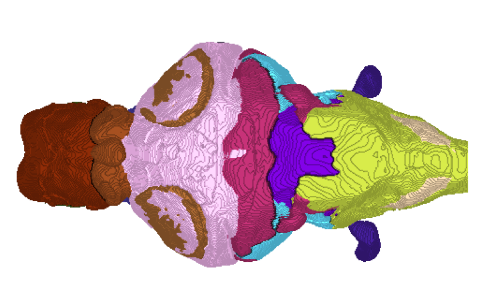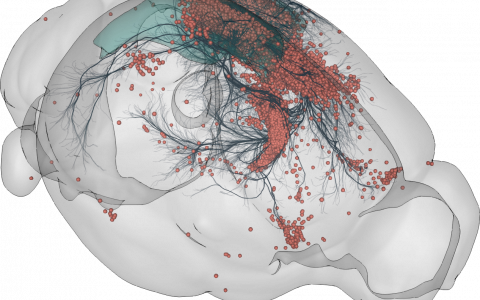
The BrainGlobe Initiative wins 2025 International Prize
The Neuro-Irv and Helga Cooper Foundation Open Science Prizes Selection Committee recognises BrainGlobe’s contribution to open science
The BrainGlobe Initiative, co-founded by neuroscientists at the Sainsbury Wellcome Centre, UCL and the Max Planck Institute for Neurobiology, has been awarded the 2025 International Prize by the Neuro-Irv and Helga Cooper Foundation Open Science Prizes Selection Committee. The award, organised by The Tanenbaum Open Science Institute, recognises BrainGlobe’s contribution to the advancement of open, accessible, and collaborative neuroscience.
“By developing a suite of interoperable, open-source tools for computational neuroanatomy, BrainGlobe has empowered researchers across neuroscience sub-disciplines and geographies to visualise, analyse, and interpret complex brain data with ease. Its broad reach—supporting diverse species, lowering technical barriers, and fostering a global community of users and contributors—has made it a cornerstone of modern computational neuroanatomy and a model for sustainable open-source software for research,” said the Prize Selection Committee.
3D rendering of labelled mouse brain cells detected by cellfinder (coral), visualised using brainrender alongside anatomical tracing data (blue) from the Allen Mouse Brain Connectivity Atlas
The award will be presented on Monday 10 November 2025 at the prize ceremony held at The Neuro in Montreal, Canada. SWC Senior Research Software Engineer, Igor Tatarnikov, will present the keynote lecture at the ceremony on behalf of the BrainGlobe team. The event will also feature presentations from the Trainee Prizes awardees from this year’s competition.
“We are delighted to receive this award, which celebrates the large community built around BrainGlobe. This is not something that’s traditionally acknowledged in academia, so it is especially pleasing to see everyone’s contributions over the past five years recognised in this way,” commented Adam Tyson, Head Research Engineer at SWC and co-founder of The BrainGlobe Initiative.
“This prize not only recognises the impact of BrainGlobe within the field of computational neuroanatomy but also celebrates the large community that has naturally developed around the BrainGlobe ecosystem. This community has enabled the continued maintenance and accelerated development of the tools, allowing the initiative to continue delivering on the goals established by its founders,” said Igor Tatarnikov, Senior Research Software Engineer at SWC.
Over 100 people from more than 70 institutions have contributed to the development of BrainGlobe tools, from high school students to full professors. The team has been working to make the tools as accessible as possible to different fields of neuroscience, and there are now 197 brain atlases in 13 different species, including mice, rats, zebrafish, and bumblebees. With thousands of BrainGlobe users worldwide, the tools have been downloaded over 3 million times.
“BrainGlobe represents the very best of open, collaborative, and field-defining scientific innovation. It has become an indispensable open-source platform for 3D brain visualisation, registration, and analysis. BrainGlobe enables researchers, from anatomists to systems neuroscientists, to efficiently process and interpret complex neuroanatomical data. Its accessibility, modular design, and seamless integration with imaging pipelines have made it a transformative tool in both research and teaching,” commented Dr Pantelis Tsoulfas, Associate Professor in the Departments of Neurological Surgery and Cell Biology at the University of Miami.
“These tools have become so integral that it’s now very difficult to imagine being able to undertake the kind of research we are interested in pursuing without them,” added Troy Margrie, Professor of Systems Neuroscience and Associate Director at the Sainsbury Wellcome Centre.
The BrainGlobe Initiative originated from tools developed in the Margrie and Branco labs at SWC, in collaboration with the Portugues lab, initially based at the Max Planck Institute for Neurobiology in Munich, Germany, and now at Cornell University in the United States. As the number of tools and demand grew, a need arose for a full-time software engineering group to support the maintenance required to sustain them. Core funding from SWC, along with grants from the Chan Zuckerberg Initiative, enabled BrainGlobe to continue maintaining and developing the software packages.
With the International Prize funds, the BrainGlobe team aims to further strengthen and grow its global community by running training courses, hosting hackathons and expanding its summer school. The team remains committed to making the tools as accessible as possible, working to ensure they run efficiently on lower-cost computer hardware and can be applied to a broader range of data types across species. Looking ahead, BrainGlobe will continue to foster an inclusive and engaged user community, while supporting others to develop and integrate their own tools within the BrainGlobe ecosystem.
“I am over the moon to see BrainGlobe's efforts and impact recognised. I hope it is part of progress towards wider recognition for collaborative open-source projects beyond BrainGlobe that need support and play important roles for science,” concluded Alessandro Felder, Senior Research Software Engineer at SWC.
About The BrainGlobe Initiative
The BrainGlobe Initiative facilitates the development of interoperable Python-based tools for computational neuroanatomy. There are currently 17 software packages, with the core package, BrainGlobe Atlas API, providing an interface to various atlases, enabling neuroscientists to use the tools to study different species. The BrainGlobe core developers have created a number of tools, including cellfinder, brainreg, and brainrender, and more recently, members of the community have also built their own software that leverages the BrainGlobe ecosystem.
To find out more, visit the BrainGlobe website.
About the Neuro-Irv and Helga Cooper Foundation Open Science Prizes and the International Prize
An initiative from The Tanenbaum Open Science Institute, the prizes recognise projects, services, tools, and platforms that unlock the power of open science in neuroscience to advance research, innovation, and collaboration for the benefit of health and society.
The International Prize is awarded to an individual or a group of five individuals working in research organisations or open science non-profits around the world who have maintained, valorised, and/or delivered open science practices, policies, or tools that have had a demonstrable impact on neuroscience research. The prize comes with $80,000 CAD.
For more information about the International Prize, visit the Neuro website.
Media contact
For more information or to speak to the BrainGlobe team, please contact:
April Cashin-Garbutt
Head of Research Communications and Engagement, Sainsbury Wellcome Centre
E: a.cashin-garbutt@ucl.ac.uk T: +44 (0)20 3108 8028


